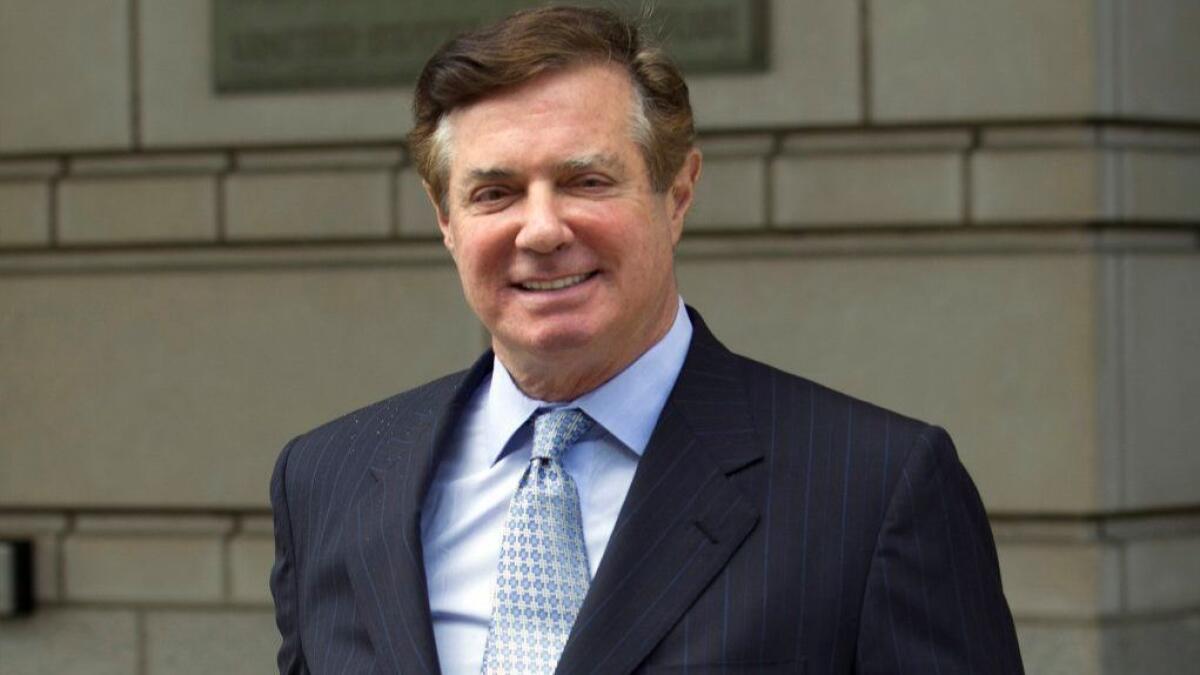Newsletter: Pardon Manafort, invite impeachment

Good morning. I’m Paul Thornton, and it is Saturday, Dec. 1, 2018. Mexico has a new president today. Let’s take a look back at the week in Opinion.
By the time this newsletter lands in your inbox, it may already be obsolete. This edition leads off Russia, the lodestone that’s been hanging around the Trump administration’s neck since Day 1 — specifically, the possibility that Paul Manafort may be pardoned; more on that later — and things have accelerated so quickly in special counsel Robert S. Mueller III’s investigation that it may be pointless to commit any analysis to print before the end of this presidency.
But news about the Trump Organization’s ethically unacceptable secret negotiation during the 2016 campaign to build a Moscow skyscraper just reinforces what anyone who strongly opposes this administration has believed (correctly) since Inauguration Day: This presidency was bound to be defined by its sleaziness. It might be surprising, then, that a president would behave like a mob boss in getting information about an investigation from an attorney supposedly looking out for the best legal interest of his client — in this case, former campaign chairman Manafort — but it shouldn’t be surprising that Trump would behave this way.
Which brings us back to Manafort, who was ostensibly a cooperating witness for Mueller while his attorney was in communication with Trump’s lawyers. It’s been said that the only way Manafort’s behavior makes sense is if he believed he would be getting a pardon from the president — and in an interview this week, Trump refused to take pardoning Manafort off the table. Such an action, warns The Times Editorial Board, would be solid grounds for impeachment, and Trump should walk back his remarks now:
On Tuesday, the New York Times reported that one of Manafort’s lawyers had repeatedly briefed Trump’s attorneys about Manafort’s conversations with federal investigators after Manafort agreed to cooperate with Mueller. Legal experts have called that a violation of legal norms.
You don’t have to be a conspiracy theorist to suspect that all these developments are related. After pushing Jeff Sessions out of the Justice Department, Trump did not take the obvious step of designating Deputy Atty. Gen. Rod Rosenstein as acting attorney general. Instead, he installed Sessions’ chief of staff, Matthew Whitaker, who was critical of the Mueller probe before he joined the administration. That clearly threatens the credibility of the investigation.
For the moment, Mueller has been proceeding on several fronts, including an exploration of whether Trump associate Roger Stone is linked to WikiLeaks and the release during the 2016 campaign of Democratic Party emails hacked by Russians. (Stone has denied any wrongdoing.) On Thursday, prosecutors announced that Michael Cohen, Trump’s former lawyer and “fixer,” had pleaded guilty to lying to Congress about when discussions about a possible Trump real estate project in Moscow came to an end.
Given these developments, Trump might be tempted to take action against Mueller from which he so far has reluctantly refrained. ...
Trump repeatedly has insisted that there was “no collusion” between Russia and his campaign. If the president is confident of his innocence, he should stop the disgraceful attacks on Mueller and expeditiously nominate a new attorney general whose impartiality when it comes to the Mueller investigation can’t be questioned.
As for pardons for those the special counsel has prosecuted, Trump must take them off the table. The only message he should be sending to Manafort and others caught up in Mueller’s investigation is to tell the truth and accept the consequences.
Trump can’t fire Mueller’s grand jury. The Senate blocked a bill to protect the special counsel, but the group of 16 to 23 randomly selected citizens that has been issuing indictments in the Mueller investigation needs no such protection. Only the presiding judge can dissolve the grand jury, and if the president fires Mueller, it’s that judge’s prerogative to appoint another prosecutor. L.A. Times
The rest of the country has snow days. We have “smoke days,” and not the cigarette kind. The choking air in Northern California’s population centers forced the closure of schools, but not in the same way that inclement winter weather in the Midwest provides for a joyful respite outdoors. Libraries and businesses with filtered indoor air were filled with people during the Camp fire, but that escape from the polluted outdoors was probably not enough to prevent lasting damage to people’s health. The Atlantic
Let the (smaller) wildfires burn. It’s better and more natural than the logging favored by the Trump administration, and thicker forests made so by decades of aggressive fire suppression have created environments ripe for catastrophe. New York Times
Democrats won, but they need to campaign more like Republicans. Linguist and cognitive scientist George Lakoff (Fun fact: I had him as a professor at UC Berkeley) doesn’t expect Democratic politicians to abandon their fealty to the facts and stir racial resentment, but he does want them to communicate their values and repeat their message — a lot. “Hillary Clinton never said what her values were,” he told columnist Patt Morrison. “It was amazing. She just gave policy after policy, but never said what she stood for.” L.A. Times
Close San Ysidro? That’s so un-Californian. The port of entry between Tijuana and San Diego is the busiest border crossing anywhere in the Western Hemisphere, and President Trump is treating it like a “Call of Duty” battle zone. This is a disgrace, says Gustavo Arellano. L.A. Times
Reach me: paul.thornton@latimes.com
